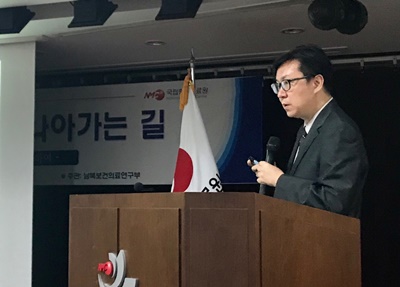About 42 percent of North Koreans who have defected to the South are suffering from somatization, and the nation should provide them with both psychological and physical treatments, a medical professor said. Somatization refers to the expression of psychological problems as physical symptoms.

Kim Seok-ju, a professor of the mental health department at Sungkyunkwan University’s School of Medicine, emphasized an integrated approach to the treatment of North Korean defectors, at a symposium at the National Medical Center on Thursday, titled, “The way for the two Koreas to become a unified health community.”
Kim attributed the somatization of North Korean defectors to psychological internalization of social oppression, Oriental medicine-based observations of diseases (symptom-centered), the circumstance under the regime (socialist characteristics), and prevalence of self-diagnosis.
“North Korean defectors do not say they feel insecure or depressed. Instead, they express themselves with body aches such as a headache. Even if they go through exams due to such somatization, physicians fail to discover any physical abnormality,” Kim said. “Because of repetitive tests and treatments, their distrust in South Korean medical care only grows in the end.”
“As a result, the North Korean defectors are experiencing various difficulties in mental and physical health such as somatization and nonspecific physical symptoms. Somatization is common because they tend not to express anxiety, depression, shame, and guilt," he added.
The South Korean medical community should receive education about the North’s culture and characteristics of healthcare, prepare treatment guidelines for defectors, and seek integrated medical care between the mental health department and other departments.
Kim also stressed that the South should provide North Korean defectors with education about the medical culture, characteristics and user guidelines here.
“Just one institution alone cannot address these kinds of problems. Agencies such as mental health centers and Hana centers should solve the problems together,” he said. Hana centers are support centers for North Korean defectors run under Hanawon, a South Korean facility for the re-education of North Korean defectors.

